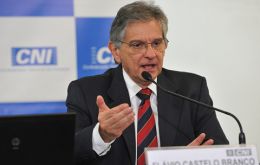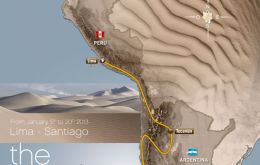MercoPress. South Atlantic News Agency
Stories for March 23rd 2012
-
Friday, March 23rd 2012 - 23:22 UTC
US nominates public health expert of South Korean origin for World Bank top job

The United States has nominated a public health expert of South Korean origin as its candidate for the World Bank presidency, a job emerging market economies are contesting for the first time.
-
Friday, March 23rd 2012 - 23:11 UTC
Another Argentine province cancels oil concessions to Spain’s held YPF

The Argentine province of Mendoza joined on Friday other oil producing areas of the country in cancelling concession contracts which has been awarded to the Spanish owned oil corporation Repsol-YPF, with which the government of President Cristina Fernandez is involved in a controversy over long term investment.
-
Friday, March 23rd 2012 - 22:56 UTC
Fitch lowers Repsol-YPF rating; growing intervention of Argentine government feared

Fitch Ratings has lowered its long-term rating on Spanish oil company Repsol YPF SA by one notch to BBB after its Argentine unit said it would pay out its dividend in shares instead of cash. Last week Moody’s adopted a similar decision. The company is currently in a dispute with the Argentine government.
-
Friday, March 23rd 2012 - 22:51 UTC
Argentina has at least a three-tier foreign money market: formal, informal and ‘cash overseas’

The strict foreign currency controls and restrictions on the purchase of US dollars in Argentina have created the traditional black or informal market and a more sophisticated option by acquiring dollar denominated assets which can be cashed overseas such would be the case of shares from companies trading in New York.
-
Friday, March 23rd 2012 - 06:00 UTC
World’s largest beef producer cuts losses in Argentina and prepares to leave

Brazil’s JBS, the world's biggest beef producer is on the verge of exiting Argentina due to a difficult business environment and because it is not prepared to tolerate further losses in the country.
-
Friday, March 23rd 2012 - 02:25 UTC
One in five manufactured goods consumed in Brazil were imports

Almost one in five manufactured goods consumed in Brazil during 2011 was imported, according to the ‘commercial opening coefficient’ survey undertaken by the country’s National Industry Confederation, CNI, and released this week in Sao Paulo.
-
Friday, March 23rd 2012 - 02:18 UTC
Canada in exploratory talks with Mercosur for a trade agreement

Canadian Minister of International Trade Ed Fast has concluded a two-day trade visit to Argentina, to promote the conclusion of exploratory talks towards a possible free trade agreement (FTA) with the Mercosur trade bloc.
-
Friday, March 23rd 2012 - 00:41 UTC
Dakar rally confirms next edition along the Pacific, Chile and Peru

Dakar Rally’s organization confirmed that next year’s 35th edition of the world’s most famous race will also be the 5th to take place on the South American continent, which has hosted the event since 2009.
-
Friday, March 23rd 2012 - 00:34 UTC
Populism very much alive in Latam subtly converted to ‘delegative’ democracy

Populism in Latinamerica has moved from the dictatorships of past decades to the so called “delegative” democracies such as those of Venezuela and Argentina, according to a group of Latam intellectuals meeting in Peru in an international seminar, “Latin America: opportunities and challenges”.
